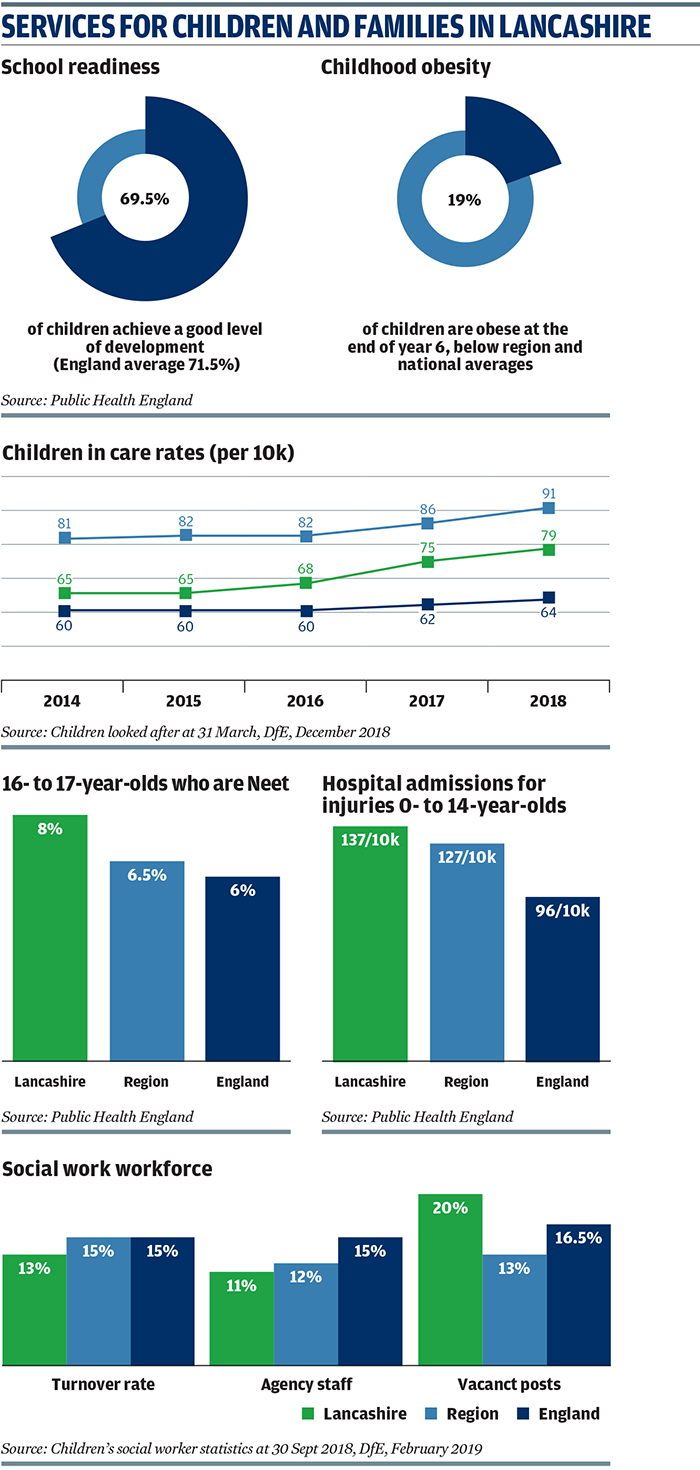Lancashire County Council: Local Spotlight
Derren Hayes
Tuesday, October 29, 2019
Large North West council unveils plans to implement new early help approach that leaders hope will reduce numbers in care.

"Partnerships is our game," says Edwina Grant OBE, executive director of education and children services (DCS) at Lancashire County Council.
The latest example of Lancashire's partnership approach involves the council working with police, schools, health and voluntary organisations to implement a new early help and practice model in the county with the aim of reducing the number of looked-after children.
The initiative will see the council invest £6m in implementing the Strengthening Families, Protecting Children approach over the next three years, supplemented by a share of £84m the government has set aside to roll out the programme in 18 local authorities.
Strengthening Families, Protecting Children will see children's agencies working together to provide early help to struggling families so that children can remain at home instead of being subject to a care order. It was pioneered by Hertfordshire County Council in 2015.
Lancashire, like the North West region, has high rates of children in care in England (see graphics), and Grant hopes the new service will reduce this and improve outcomes for young people (see DCS view). Research found Hertfordshire reduced the number of children involved in care proceedings by more than a third, and Lancashire hope a similar return on their investment will mean the service is self-sustaining by the end of the three years.

Grant, who joined the council in January after five years at the Local Government Association as national children's services adviser, says that since returning - she worked for the council up to 1999 before holding DCS roles in Nottingham City and Redbridge and a five-year spell as DCS and deputy chief executive in Central Bedfordshire - she has been struck by how closely the council works across agency and geographical boundaries in areas such as safeguarding, adoption, public health and special needs.
Such an approach is particularly crucial in an area covering 3,000sq/km. Identifying areas that lend themselves to cross- agency and authority working is key as some places have very different needs, Grant explains.
Specialist multi-agency teams
She joined shortly after children's services improved its Ofsted rating from "inadequate" to "requires improvement", and the council has a plan to achieve a "good" judgment. Inspectors praised a restructure of the department that saw social workers placed in specialist multi-agency teams covering small local areas, rather than generic teams.
In the past few years, the number of agency staff has fallen, as have vacant posts. There is also more stability in the senior management team.
Grant's early career was in special educational needs and disabilities (SEND) services, which is an area in need of improvement. A SEND inspection in early 2018 found parents had "lost trust" with the council and clinical commissioning group (CCG) due to a perceived lack of transparency over decisions. Grant, who chairs the improvement partnership board, says a lot of work has been done to improve relations with parents.
Last year, the council controversially awarded a five-year £104m contract to Virgin Health Care to deliver the Healthy Child Programme, health visiting and school nursing services. Grant admits there were "teething problems" but says the company will now be a key part of its plan to improve school readiness of young children over the next few years.
Despite the challenges, Grant says the county is a "fantastic place" for young people to grow up offering them access to "beautiful countryside, coast and heritage" opportunities.
DCS VIEW
‘FOCUS ON THE CHILD'S JOURNEY THROUGH THE SYSTEM IS KEY TO IMPROVEMENT'
By Edwina Grant OBE, executive director of education and children services, Lancashire County Council
Our looked-after children rate is higher than our statistical neighbours so we are strengthening preventative practice in the family. This approach will help us reduce the number of children that need specialist placements. We will put wraparound support in place to address parental mental health and substance misuse, this will be delivered by us and health, police and the voluntary sector. This wraparound support will enable children to remain in their own homes where it is safe to do so and stay in Lancashire. A testament to the police's commitment is that it is putting a £1m grant into developing violence reduction and conflict resolution programmes and support for young people to make healthy choices.
Before putting the government funding bid together we reviewed children's cases. I'm not being critical of anyone's decision making, but with the benefit of perfect hindsight we could all see there could have been different outcomes for children if we'd worked differently.
When the grant runs out after three years we need to be self-sustaining. It will take that amount of time to be fully implemented but I expect to see progress sooner - we are already seeing benefits in how much more motivated staff are, including health workers, family support teams and social workers.
The council has come a long way in recent years and I'd credit the people here before - I know how hard the journey is from "inadequate". We think we're flying now and that can be seen in the number of permanent staff that are in post and fewer agency staff, even though agency staff are important. These things tend to happen at this stage of the improvement process.
The key is that you keep focused on the child's journey through the system and that everyone understands how they play their part in that.
I'm expecting an Ofsted revisit of our SEND services. There's been a lot of focus on developing strong partnerships with parents. It is a big county and we heard a lot of people's voices. We will be able to evidence a lot of effort to listen to parents' concerns and understand their needs. Health has been a very good partner - there is an inclusion partnership that I chair but it is really a co-chair arrangement with one of the CCG chief executives. That's been an invaluable relationship and we've developed a joint approach to tackling it.
Our health partners Virgin are joining with us to address the early years language gap through developing a new strategy involving the public health team and education settings to ensure children are school ready. In addition to improving pre-school support we also need to address the language gap for young people and improve support for vulnerable young people in secondary school and college.
There's a lot of opportunities for young people in Lancashire, and our staff tell me that they are most happy when they see individual children in care get good exam results or a good job. It's heart-warming to hear that.




